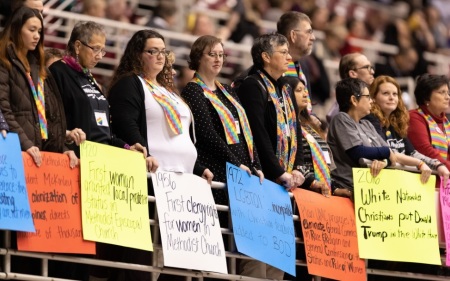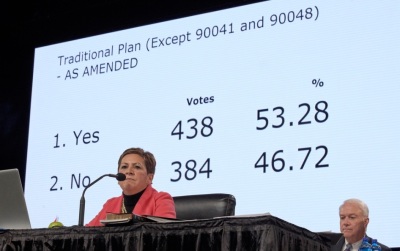Pro-LGBT churches not leaving UMC just yet, advocacy groups say

While many predicted that there would be schism within the United Methodist Church following a recent General Conference vote affirming the denomination’s stance against homosexuality and gay marriage, it may not be coming just yet, according to pro-LGBT groups.
In February, delegates at the UMC’s special session of General Conference in St. Louis, Missouri, voted to adopt a plan that not only upholds the church body’s position against homosexuality and the ordination of noncelibate homosexuals, but also put in place stricter enforcement of said rules.
The Traditional Plan succeeded in large part because of delegates representing Africa and other overseas regional bodies within the UMC.
Jan Lawrence, executive director of the Reconciling Ministries Network, which has hundreds of churches affiliated with them, told The Christian Post that leaving the denomination is not being considered.
“We do not know of any churches currently discussing exit. We are encouraging our churches not to discuss leaving at this point,” explained Lawrence.
Bridget Cabrera, executive director of the Methodist Federation for Social Action, another pro-LGBT group, told CP that she has found many churches her organization has ties with are saying they will “dissent” from the plan and “continue to welcome everyone.”
“None of the churches that I'm connected to have voiced they are planning to leave. The response has been the opposite,” said Cabrera.
For the past several years, there has been a great deal of internal debate over the UMC’s official stance on LGBT issues, with many American liberals seeking to have them changed.
In April 2017, the UMC Council of Bishops announced that there was going to be a special session of General Conference in St. Louis, Missouri, on Feb. 23–26 centered on adopting a plan to help the denomination end the debate.
The two plans with the greatest support going into the special session were “The One Church Plan” and “The Traditional Plan.”
The One Church Plan sought to have regional bodies and local congregations determine their own stance on LGBT issues. It was supported by most members of the Council of Bishops.
The Traditional Plan sought to maintain the UMC’s current position and also provide stricter enforcement of said rules while possibly giving a “gracious exit” for pro-LGBT congregations.
During the special session, delegates rejected the One Church Plan and then approved the Traditional Plan in a vote of 438-384.

Many theologically liberal United Methodists and leaders denounced the decision, with several congregations restating their support for the LGBT movement.
Adam Hamilton, senior pastor of the Church of the Resurrection, which is the largest UMC congregation in the United States, entertained the idea of leaving the denomination.
“I think it would not be hard,” said Hamilton in an interview with The Kansas City Star that was published days after the special session ended.
“I think our folks here love the United Methodist Church … they love the kind of church we have created and so we could start a new United Methodist Church and thousands of churches would join us.”
Other megachurch pastors, including Pastor Talbot Davis of Good Shepherd UMC of Charlotte, North Carolina, which has approximately 2,000 worshippers every Sunday, praised the passage of the Traditional Plan.
“I am delighted that the Special General Conference of the United Methodist Church adopted the Traditional Plan as we believe in the beautiful picture of celibacy in singleness and faithfulness in heterosexual marriage that is woven throughout the pages of Scripture as well as church teaching for since its inception,” Davis told CP in an earlier interview.
“We gladly join with our global brothers and sisters in teaching this truth with as much love and winsomeness as we can.”
The Rev. Shane Stanford, teaching pastor at Christ Church in Memphis, Tennessee, which has over 5,000 members, told CP that he was “pleased” with the result, especially the plan’s “increased accountability.”
“For my congregation in particular, the adoption of the Traditional Plan will have minimal effect. The vast legacy of my congregation’s spiritual DNA leans to a more evangelical, orthodox heritage,” said Stanford.
While approved by the majority of delegates at the special session, the Traditional Plan will need to be reviewed by the United Methodist Judicial Council in April to determine whether it will be allowed to take effect.





















